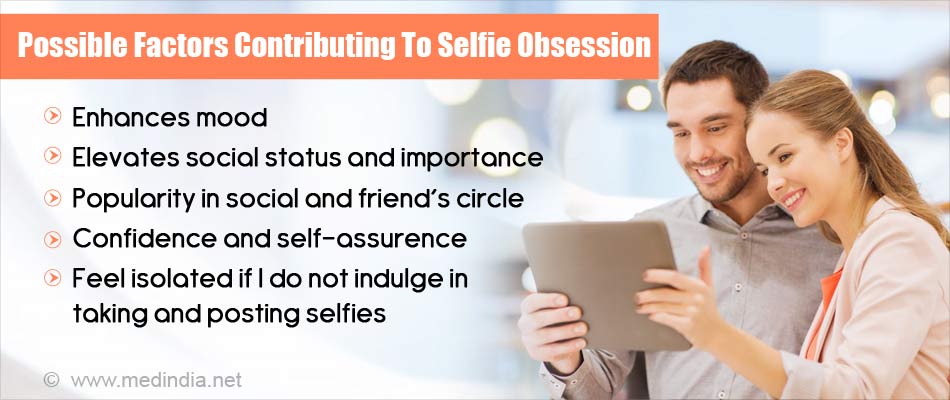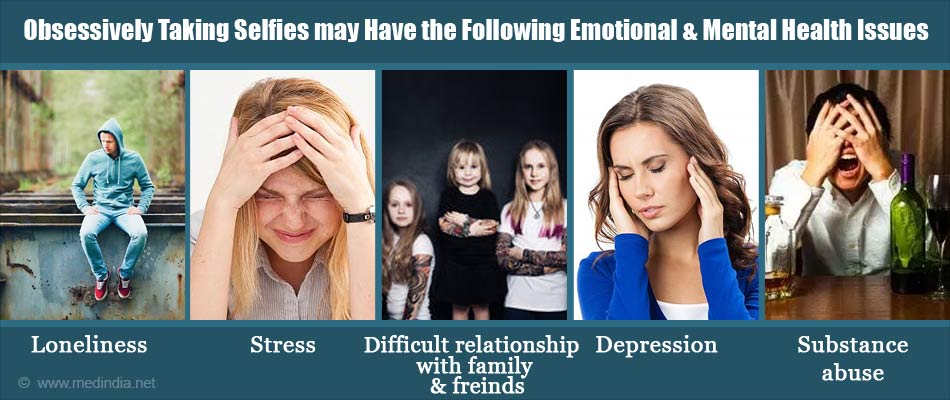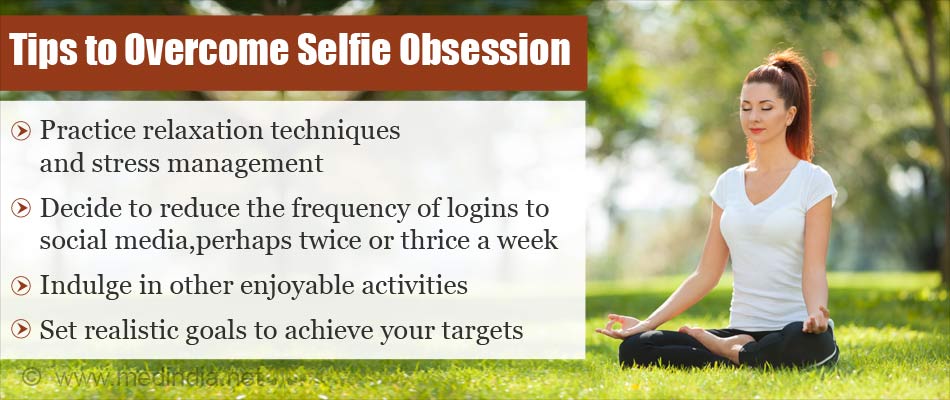- Addiction To Selfies: A Mental Disorder? - (http://www.lifehack.org/articles/communication/addiction-selfies-mental-disorder.html)
- Selfie Obsession: The Rise of Social Media Narcissism [INFOGRAPHIC] - (http://www.rawhide.org/blog/infographics/selfie-obsession-the-rise-of-social-media-narcissism/)
- The Societal Obsession with Selfies - (https://www.psychalive.org/obsession-with-selfies/)
What is Selfie Obsession / Selfie Disorder?
Holding the smartphone above your head and twisting your hand at weird angles to get that perfect selfie shot capturing your smile or mood may seem the most normal thing to do, especially among the youth. However recent studies seem to suggest that if this urge to click selfies and share it with the world is unchecked and out of control, it may indicate underlying mental health issues.
Selfie obsession or selfie disorder is the obsessive need of some persons to click photos of themselves on smartphones and post it on various social media. Psychologists and counselors warn that this may be a mental disorder and should be treated as such.
Also referred to as selfitis, the term was coined in 2014 in a spoof (fake) news story which claimed that the American Psychiatric Association was considering the option of classifying this as a mental disorder.
The spoof article nevertheless spurred a series of clinical studies, and interestingly in about two or three years, these studies appear to confirm that selfitis disorder does indeed exist and have even established a ‘Selfitis Behaviour Scale’ to assess the severity of the condition.
Dr. Mark Griffiths, Distinguished Professor of Behavioral Addiction in Nottingham Trent University’s Psychology Department, who conducted a recent major study on the selfie obsession says, “Whilst the (original) story was revealed to be a hoax, it didn’t mean that the condition of selfitis didn’t exist. We have now appeared to confirm its existence and developed the world’s first Selfitis Behaviour Scale to assess the condition.”
What are Possible Factors Contributing To Selfie Obsession?
Studies conducted have identified six factors most likely to be associated with selfie obsession. These included the following -
Environmental enhancement
- Selfie taking enhances mood and helps to appreciate the environment better
- To form good and happy memories of various experiences
- Selfies are cherished possessions for future memories
Social Competition – Needing to be best
- Elevates social status and importance
- Getting more likes and comments on social media
- Creates a healthy competition among social circle
- Making my selfie look better than others by using photo editing tools
Attention Seeking
- Helps to be popular in social and friend’s circle
- Gaining attention and notice and comments on social media
Mood Elevation
- Makes me happy, less stressed and good about myself
Improvement in Self-confidence
- Feel more confident and self-assured when taking selfies
- Looking at my selfies in private makes me more confident
Conforming to Peer Group Expectation
- Feel accepted and respected only when I take and post selfies
- Feel isolated if I do not indulge in taking and posting selfies

What are the Symptoms of Selfie Disorder?
Selfie obsession disorder or selfitis is a strange urge to keep snapping pictures of oneself and sharing it on social media. Studies indicate that persons obsessed with selfie-taking may have an underlying mental health disorder and need to seek help. Depending on the severity of the condition, selfitis is classified into three levels.
Levels of Selfitis
- Borderline- Clicking one’s photos at least three times a day but not posting them on social media.
- Acute- Taking self-pictures at least three times a day and posting all of them on social media.
- Chronic- Uncontrollable urge to take selfies continuously and posting them on social media more than six times in a day.
How Does Selfitis Affect Mental Health?
Persons obsessed with taking selfies may have one or more of the following emotional and mental health issues and may need medical help before things get out of hand
- Loneliness
- Unconscious cry for help
- Obsessed with self and oblivious to other people’s opinions or needs
- Highly attention seeking
- Difficult relations with family and friends
- Addiction tendencies
- Lacking in confidence and feeling the need to “fit” in and gain approval
- Suffering from stress
Based on questionnaires, the dominant characteristics of the person are identified as any of the following – loneliness, attention seeking, self-centered, or narcissistic (love of self).
Unless treated, the underlying personality traits and mental health issues may lead to more serious conditions such as depression, Substance abuse, suicidal tendencies and disruption in relationships.

What is the Selfitis Behavior Scale?
The Selfitis Behavior scale is a questionnaire consisting of 20 statements where the person rates each of these statements from 1 to 5 (1 meaning “strongly disagree” and 5 meaning “strongly agree”), with a maximum score of 200. A higher score increases the chances of suffering from selfitis.
Selfitis Questionnaire - 20 Statements to be Rated on a Scale of 1-5
|
Complications of Serious Selfie addiction
- Broken relationships and loneliness
- Tendency for other addictions as well
- Putting oneself at risk of cyberbullying and trolling by frequent posting of selfies
- Going to extreme lengths to secure validation of others, for example developing eating disorders to look thin and beautiful
- Depression and risk of suicide
- Psychopathic nature manifesting as taking dangerous selfies from edge of cliff, top of buildings, bridges
- Selfie deaths – being run over, falling from heights while taking selfies
How do you Treat Selfie Disorder?
Currently, no scientifically approved treatment for selfie obsession disorder exists. Some of the following measures may be tried to overcome the obsession. In some severe cases, psychological counseling and cognitive behavior therapy may be required.
- Ask yourself whether you need to carry your smartphone throughout the day and instead choose to have a basic phone to carry around
- You should decide when and how to use your smartphone to benefit you
- Decide to reduce the frequency of logins to social media, perhaps twice or thrice a week. Indulge in other enjoyable activities to resist the urge to keep visiting social media sites or reaching for your phone
- Set realistic goals to achieve your targets. Give yourself time. Believe in yourself
- Practice relaxation techniques and stress management
- Seek your parents or well-wishers cooperation to help you achieve your goals and wean you away from your selfie habit
In more severe cases when the above measures do not yield the desired result it is necessary to seek specialist help.

Cognitive behavioral therapy (CBT)
CBT is atype of psychotherapy, found to be effective in obsessive-compulsive disorders (OCD). Exposure and response prevention (ERP), a type of CBT therapy, involves exposing the person gradually to the object of obsession (smartphone in this instance) and teaching them to develop coping skills to avoid their instinctive response and the associated anxiety at not being able to indulge in the obsessive behavior.
Sessions may be individual, family or group therapy sessions.
ERP takes effort and practice, but the results can be rewarding - better quality, improved relations and a new outlook on life.
Medications:
Severe cases of selfie obsession may need a referral to a psychiatrist and medications as appropriate. Often a combination of CBT and medications have been found to offer maximum benefit in OCD. Other underlying mental disorders should be appropriately treated as well.
In conclusion, although it may sound dramatic to refer to selfie obsession as a mental health disorder, several scientific studies have strengthened the validity of this claim. Like all things in life, using smartphones and social media are best done in moderation.





